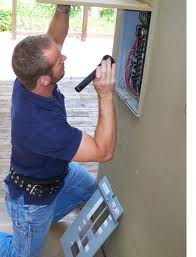,
Buying fixer-upper houses, repairing them, and renting them out is a safe way to generate short-term income and long-term wealth. But, how can you be sure that a house is worth what you are offering to pay for it? Based on experience, we can eyeball the property and probably be able to make a pretty accurate estimate of its worth 90% of the time.
However, that’s not good enough. We need more information than our educated eyeball can provide. In order to:
1.) avoid any surprise defects after its too late, and
2.) negotiate a lower selling price for the house,
we hire a professional inspector to do a physical and structural inspection.
For the last post related to due diligence see Due Diligence Property Inspection, Part 8 – pest control and property damage.
Most purchase agreements require the seller to deliver the property in good physical condition with all basic systems in good shape, unless the seller discloses otherwise. Generally, the inspection process reveals deficiencies that need to be corrected, whether they were disclosed or not.
So with inspection reports in hand, you are armed to arrange for the seller to correct the noted items at his/her expense. The seller is trapped in a corner. He reads the report and sees the photos showing the inescapable evidence that repairs are needed. He either makes the repairs or you walk.
Inspect the inspectors before you hire one.
Most investors hire a property inspector based on the advice of a real estate agent, which is not necessarily a bad way to go. But, you will be spending a tidy sum to hire an inspector, so its best to interview a few before deciding. You may see a big differences in experience, qualifications, and ethical standards. I would never hire an inspector who would not allow me to accompany him during the inspection.
Tagging along with the inspector presents a great opportunity to learn about your property, and will arm you with knowledge that will be invaluable throughout your entire ownership of the house. You’re the one paying for the inspection. How can the inspector say no?
If you want a true professional, hire a full-time inspector who perform 100 inspections a year and who carries “errors and omissions” insurance. This coverage tells you that the person is working full time in the field and is participating in ongoing continuing education.
To locate certified inspectors and find out more about the inspection process see the American Society of Home Inspectors web page.
Ask for a sample of one of the inspector’s recent inspection reports prepared for a comparable property. And, require your finalists to provide you contact information for 3 people who have used their service in the last 6 months.
Price should be a secondary concern because like other professional services, they often pay for themselves. An internet estimate of inspection costs indicates that prices range from $215 to $750, with an average price of $260 (in the southwest where I live).
Earlier articles in this series:
Due Diligence Part 7, Physical and Structural Inspection
Due Diligence Part 6, Tricks Sellers Use to Avoid Inspections
Due Diligence and Fixer Upper Properties Part 5 – the “as-is” sale
Due Diligence, Part 4 — Disclosure Requirements
Due Diligence, Part 3 — Inspecting the Property
Conducting Due Diligence, Part 2 — Reviewing books and records
Conducting Formal Due Diligence
Info on Terry’s Book

 Subscribe in a reader
Subscribe in a reader
Share this: del.icio.us | Digg | Ma.gnolia | Reddit | Stumble Upon |






